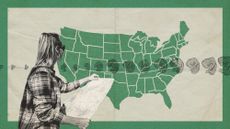How a productivity phenomenon explains the unraveling of America
The consequences of Baumol's Cost Disease

Agatha Christie once remarked that she never thought she'd be so rich that she could afford a motor car, nor so poor that she couldn't afford servants. It's a pithy encapsulation of the scope of technological and social change she lived through, and for those who value a socially mobile and egalitarian society, both of those changes probably count as progress.
What's less immediately obvious is that those changes are related to one another — but they are. In a very real sense, the increasing affordability of automobiles is what made it more and more expensive to keep servants. In our own day, though, that combination — machines getting more powerful and in-person services getting more expensive — is less likely to be reflected in greater social mobility, and less likely to feel like progress. The mysterious cause is the same as it was for the changes Agatha Christie observed: Baumol's Cost Disease.
Baumol's Cost Disease is the phenomenon whereby rising labor productivity in one part of the economy drives up the cost of labor generally, and thereby makes labor-intensive parts of the economy more expensive. The classic example is live classical music. Productivity in playing classical music cannot really be increased, practically speaking, because an individual performer is needed to play each instrument, and the same number of instruments are needed to play a given classical piece as originally orchestrated. Moreover, it takes the same years of training to become a top-flight classical musician as it always did.
Subscribe to The Week
Escape your echo chamber. Get the facts behind the news, plus analysis from multiple perspectives.

Sign up for The Week's Free Newsletters
From our morning news briefing to a weekly Good News Newsletter, get the best of The Week delivered directly to your inbox.
From our morning news briefing to a weekly Good News Newsletter, get the best of The Week delivered directly to your inbox.
Rising productivity should raise living standards generally: More people can afford cars and flat-screen televisions that benefit directly from improvements in manufacturing productivity, but also vacations and nights out at restaurants due to rising incomes overall from those same productivity increases. But classical musicians aren't contributing to those productivity increases. If, as a consequence, their wages stagnate, they'll fall further and further behind in their standard of living relative to their educational peers. If their wages do rise, then the cost of running an orchestra must go up even though the orchestra isn't providing a service any different than it used to be. To offset that, either the size of the orchestra has to shrink (a decline in quality), or the price of tickets must become more and more expensive until such concerts become a pure luxury good.
To some extent, all three things have happened, and that fact has some real consequences related to the place of classical music in the culture, its relationship to wealth, etc. But music — even classical music — hasn't vanished because concerts have gotten more expensive. Indeed, analog recording, broadcasting, and digital technology have each opened up new vistas for both musicians and music-lovers that didn't exist in an earlier era when live performance was the only way music could be heard. A dynamic economy adapts, people substitute one good for another, and we generally conclude that the overall change is for the better precisely because productivity increases translate into better lives overall.
Baumol's Cost Disease has much more significant consequences, though, when you consider some other sectors that are inherently labor-intensive, and therefore haven't achieved (and perhaps can't achieve) steady increases in productivity, but that are less readily substitutable than in-person concerts.
Take education. If students genuinely need personal interaction with a teacher (and they do), and teachers have real limits on how many students they can personally interact with (and they do), then there are very real limits on our ability to increase productivity in education. Yes, broadband has made it possible to deliver some educational services far better than before, and students have far more resources at their fingertips with the internet today than they did when they had to make do with old textbooks. But the COVID era's disruptions have surely brought home how essential in-person instruction still is, particularly in the younger grades. The debate on the importance of class size has generally revolved around whether a marginal dollar is better spent on hiring more teachers or on better teacher training (or just attracting more capable teachers with higher salaries). Because of Baumol's Cost Disease, though, more dollars are necessary each year simply to sustain the same quality of teaching at the same level of teacher-student interaction.
Or take health care. If the quality of patient care is correlated with the amount of time and attention an individual doctor pays them (and it is), then attempts to improve productivity by making doctors work faster should result in poorer quality care. Greater efficiencies could still be achieved by a better allocation of resources: giving nurses greater autonomy and responsibility, for example, or reducing the amount of physician time spent on paperwork. Technology can also deliver genuine efficiencies in certain fields, such as radiology; and of course innovative new drugs, medical devices, and procedures have made it possible to survive and recover from ailments and injuries that would have killed or crippled people in years past. But the bottleneck of person-to-person interaction remains at the heart of basic health care, and will continue to drive costs up or quality down — indeed, the dynamic may get worse as especially labor-intensive sub-sectors like long-term care consume an increasing fraction of the national health-care budget.
Or take public safety. If policing works best when an officer has a close relationship with a community and walks a regular beat, then it is inevitably labor-intensive. Efforts to increase productivity through data collection, assessing what neighborhoods and even street corners are “high crime” areas and flooding them with police, may enable a department to do more with less manpower. But it runs the risk of actually reducing knowledge as statistics replace human understanding, and even if they have some effect in reducing crime, that reduction may come at a cost of other reductions in quality (e.g. a higher incidence of complaints about police interactions). The same goes in spades for replacing manpower with firepower, as so many police departments have done. But the alternative — having adequate manpower and taking the time to develop deeper community relationships — becomes increasingly expensive as productivity elsewhere drives up labor costs everywhere.
In all three areas — education, health care, public safety — there is an irreducible element of hands-on, person-to-person interaction that cannot be eliminated. Nor can it readily be outsourced to lower-wage countries, a secondary driver of apparent productivity increases in manufacturing (and one with profound social consequences in terms of increased inequality at home). We can — and should — look for ways to make all three sectors more efficient. But we should also rationally expect them to get more expensive, and to consume an ever-increasing share of the national income, unless we're willing to let their quality deteriorate or put them out of reach for an increasing share of the population.
That has profound political consequences, because unlike Agatha Christie's servants, education, health care, and public safety aren't luxuries. They're not only essential goods, but things that we think of as essentially public goods. Yes, private education has always been available to the wealthy, but compulsory public education has long been viewed as a pillar of democracy and essential to social mobility. No, the United States doesn't have universal health care, but even the advocates of privatization are generally reluctant to aver openly that public health isn't a matter of public concern. And while protesters in the street chant “defund the police,” their actual intention is to spend more on a variety of social services that the police deliver poorly. Whatever the unintended effects of their reforms might be, they aren't marching for a world where the wealthy have private security and the poor are left without recourse.
If Baumol's Cost Disease is an important driver of costs in these sectors, then we should expect them to consume an ever-increasing share of the national income — but not only that. If we socialize those functions so as to provide equal services to the citizenry, taxes will have to increase every year just to keep quality steady. And if we don't raise taxes enough, then inequality will increase even as costs rise, leaving more and more of the population poorly provided for. And in either case, in a world of tight budgets, these sectors will increasingly be competing with each other for the marginal public dollar, and devaluing competing sectors' contributions to the public good.
It's a recipe for perpetual revolt by both by those who pay more into the system, who feel — rightly — like they're paying more and more for less and less, as well as by those who pay less into the system who feel — rightly — like services are getting less and less equitable even as they are getting economically squeezed harder and harder. And if "perpetual revolt" sounds a lot like America today — and it should — then sadly, because of Baumol's Cost Disease, satisfying the demands that fuel that revolt may not be possible.
Instead of expecting miracles, we need to properly distinguish between real opportunities to achieve efficiencies (which are all the more important to find in the face of inexorably rising labor costs) and illusory “efficiencies” that are actually just ways of degrading quality and pushing costs onto the public. And if we can't get more for less, we need to make the case that it's worth paying more for more instead of settling for less and less.
Sadly, Baumol's Cost Disease is incurable. All we can do is learn to live with it as a chronic condition.
Create an account with the same email registered to your subscription to unlock access.
Sign up for Today's Best Articles in your inbox
A free daily email with the biggest news stories of the day – and the best features from TheWeek.com
Noah Millman is a screenwriter and filmmaker, a political columnist and a critic. From 2012 through 2017 he was a senior editor and featured blogger at The American Conservative. His work has also appeared in The New York Times Book Review, Politico, USA Today, The New Republic, The Weekly Standard, Foreign Policy, Modern Age, First Things, and the Jewish Review of Books, among other publications. Noah lives in Brooklyn with his wife and son.
-
 Crossword: April 19, 2024
Crossword: April 19, 2024The Week's daily crossword puzzle
By The Week Staff Published
-
 In what states is abortion legal, illegal, and in limbo?
In what states is abortion legal, illegal, and in limbo?In The Spotlight Where American states stand on abortion care
By Theara Coleman, The Week US Published
-
 Sudoku hard: April 19, 2024
Sudoku hard: April 19, 2024The Week's daily hard sudoku puzzle
By The Week Staff Published